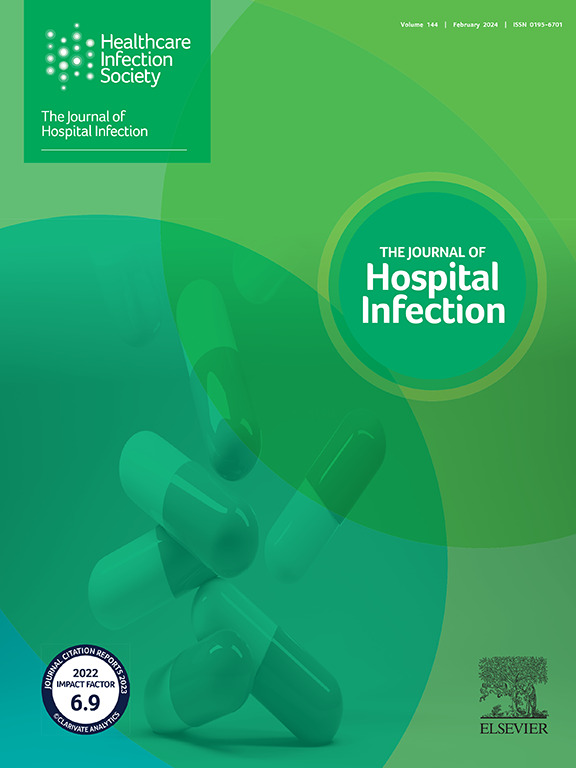错过的感染预防和控制活动及其预测因素:大流行前后研究的启示。
IF 3.9
3区 医学
Q1 INFECTIOUS DISEASES
引用次数: 0
摘要
目的:主要目的是比较大流行前后错过的感染预防和控制 (IPC) 活动的差异(如果有的话)以及相关的预测因素。次要目的是确定错过的 IPC 活动与未完成的护理之间的关系:按照调查研究报告核对表指南,于 2019 年(大流行前,184 名护士)和 2024 年(大流行后,240 名护士)在一家大型学术医院进行了重复横断面设计。感染预防与控制护理缺失调查(MNC-IPC)(A部分:缺失活动,B部分:原因)、未完成护理调查(UNCS)和专业数据在这两个时期内统一收集:自我报告错过的 IPC 活动从 5 项中的 2.15 项(95% CI,2.05-2.25)降至 1.51 项(95% CI,1.45-1.58)(p < 0.0005),相关原因也从 4 项中的 2.35 项(95% CI,2.24-2.46)降至 2.20 项(95% CI,2.11-2.30)(p = 0.046)。不同预测因素对 MNC-IPC 总分总方差的解释分别为 22.8%(大流行前)和 20.7%(大流行后):系统层面问题(估计值为 0.409,p = 0.008)和护士离职意向(0.107,p = 0.023),而在大流行后,上一班收治的病人数量(0.015,p = 0.053)、组织问题(0.186,p < 0.0005)和优先级设定问题(0.092,p = 0.053)。跨国公司 IPC 和 UNCS 的得分在这两个时期都有显著的相关性:大流行后,错过 IPC 活动的可能性较小,这可能是由于系统在大流行期间所做的努力和吸取的经验教训,这可能使护士的 IPC 实践常规化。总体而言,大流行后,预测 IPC 护理遗漏的因素发生了变化,这表明出现了新的模式,需要采取创新的干预措施,特别是在科室层面和针对年轻护士。UNCS 和 MNC-IPC 之间的相关性表明,有针对性地改进一个领域很可能会在另一个领域产生积极的结果。然而,尽管两者有共同之处,但它们代表了两种截然不同的现象。本文章由计算机程序翻译,如有差异,请以英文原文为准。
Missed Infection Prevention and Control Activities and Their Predictors: Insights from a Pre- and Post-Pandemic Study
Aim
The primary aim was to compare differences, if any, in missed infection prevention and control (IPC) activities before and after the pandemic, along with the related predictors. The secondary aim was to identify relationships between missed IPC activities and unfinished nursing care.
Methods
A repeated cross-sectional design was conducted in 2019 (pre-pandemic, 184 nurses) and 2024 (post-pandemic, 240 nurses) in a large academic hospital following the Checklist for Reporting of Survey Studies guidelines. The Missed Nursing Care in Infection Prevention and Control Survey (MNC-IPC) (Part A: missed activities, Part B: reasons), the Unfinished Nursing Care Survey (UNCS), and professional data were collected homogeneously across both periods.
Findings
Self-reported missed IPC activities decreased from 2.15 out of 5 (95% CI, 2.05–2.25) to 1.51 (95% CI, 1.45–1.58) (p < 0.0005), as did the related reasons, which decreased from 2.35 out of 4 (95% CI, 2.24–2.46) to 2.20 (95% CI, 2.11–2.30) (p = 0.046). The total variance in the MNC-IPC overall scores was explained by 22.8% (pre-) and 20.7% (post-pandemic) by different predictors: system-level issues (estimated value 0.409, p = 0.008) and nurses’ intention to leave (0.107, p = 0.023) in the pre-pandemic and by the number of patients admitted in the last shift (0.015, p = 0.053), organisational issues (0.186, p < 0.0005) and priority-setting issues (0.092, p = 0.053) in the post-pandemic period. MNC-IPC and UNCS scores have reported significant correlations in both periods.
Conclusion
Missed IPC activities were less likely in the post-pandemic period possibly due to system efforts and lessons learned during the pandemic, which may have routinised IPC practices among nurses. Overall, predictors of missed IPC care changed after the pandemic, suggesting new patterns and the need for innovative interventions, particularly at the unit level and targeting younger nurses. The correlations between UNCS and MNC-IPC suggest that targeted improvements in one area are likely to yield positive outcomes in the other. However, despite their commonalities, these represent two distinct phenomena.
求助全文
通过发布文献求助,成功后即可免费获取论文全文。
去求助
来源期刊

Journal of Hospital Infection
医学-传染病学
CiteScore
12.70
自引率
5.80%
发文量
271
审稿时长
19 days
期刊介绍:
The Journal of Hospital Infection is the editorially independent scientific publication of the Healthcare Infection Society. The aim of the Journal is to publish high quality research and information relating to infection prevention and control that is relevant to an international audience.
The Journal welcomes submissions that relate to all aspects of infection prevention and control in healthcare settings. This includes submissions that:
provide new insight into the epidemiology, surveillance, or prevention and control of healthcare-associated infections and antimicrobial resistance in healthcare settings;
provide new insight into cleaning, disinfection and decontamination;
provide new insight into the design of healthcare premises;
describe novel aspects of outbreaks of infection;
throw light on techniques for effective antimicrobial stewardship;
describe novel techniques (laboratory-based or point of care) for the detection of infection or antimicrobial resistance in the healthcare setting, particularly if these can be used to facilitate infection prevention and control;
improve understanding of the motivations of safe healthcare behaviour, or describe techniques for achieving behavioural and cultural change;
improve understanding of the use of IT systems in infection surveillance and prevention and control.
 求助内容:
求助内容: 应助结果提醒方式:
应助结果提醒方式:


